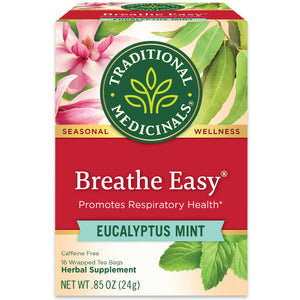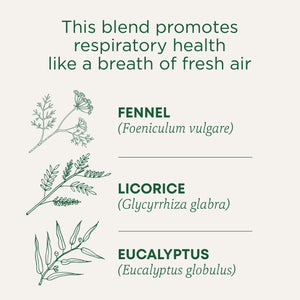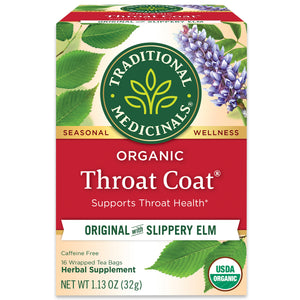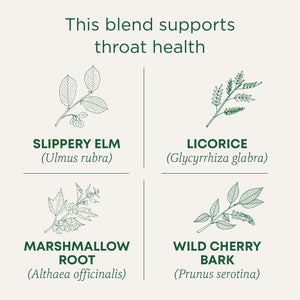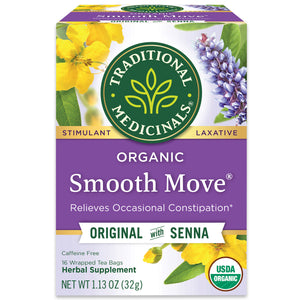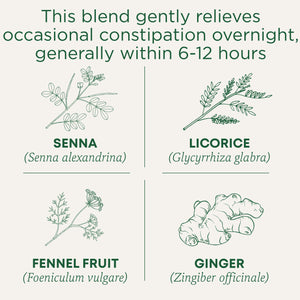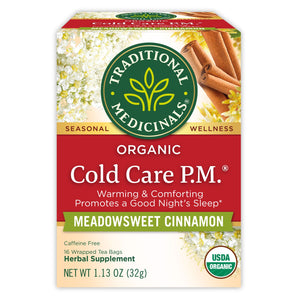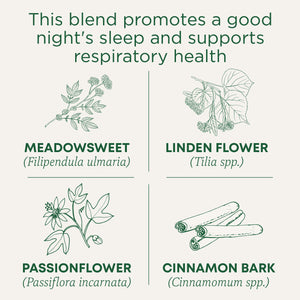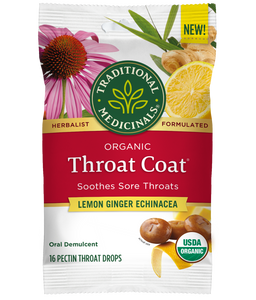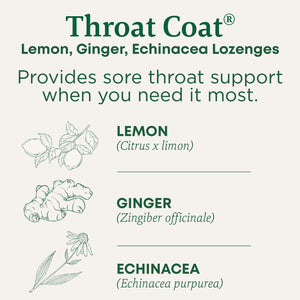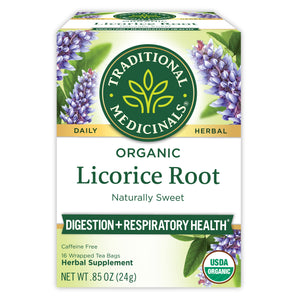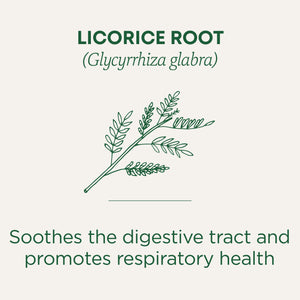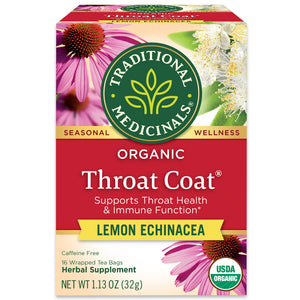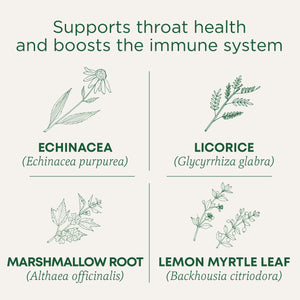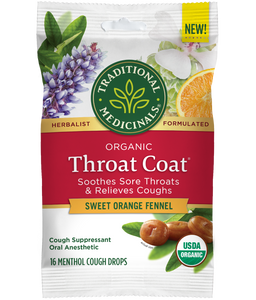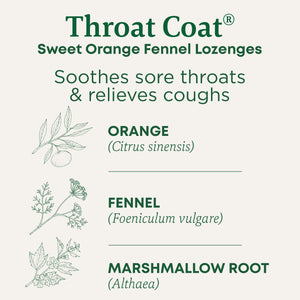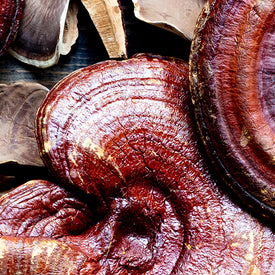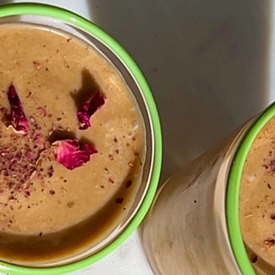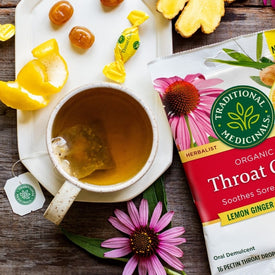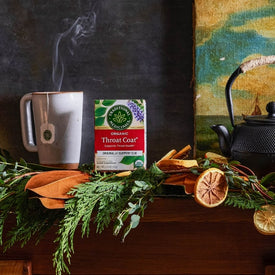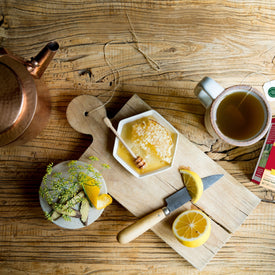Without much thought from us, our respiratory system is in constant conversation with our environment. It is designed to take in life-giving oxygen, while also protecting our internal systems from the flurry of other material that comes along for the ride. As you will learn below, respiratory health using traditional herbal remedies is all about keeping the entire respiratory system in a state of optimal functioning, by using plant allies to promote this system’s natural processes.
Respiratory System Basics
When we say respiratory system health, you may automatically start to think about your lungs. This is a very common generalization, but the respiratory system takes a lot of twists and turns before arriving at its final destination; anatomically the lungs are basically the end point of respiration. Long before air ever arrives at the lungs, it has to travel through our upper respiratory tract and the majority of our lower respiratory tract. This is because the lungs are designed solely for the exchange of gasses: carbon dioxide out, oxygen in. However, the air we breathe isn’t just oxygen, it’s full of dust, pollen, and other particles, all of which have to be captured and removed before air reaches this layer of sensitive tissue.
Respiration is divided into the upper and lower respiratory tract. The upper tract includes the nose and nasal passages, paranasal sinuses, and throat – consisting of the pharynx and the portion of the larynx above the vocal folds. The lower respiratory tract includes the portion of the larynx below the vocal folds, trachea, bronchi and bronchiole, and the lungs. The passage from the nose and mouth to the bronchioles is designed to carry air from outside the body to the lungs. The lungs are a pair of large, spongy organs covered in alveoli and capillaries which allow air entering the alveoli to exchange its gases with the blood passing through the capillaries. Oxygen enters the blood stream here, and carbon dioxide exits, to be exhaled out into the external atmosphere. The primary muscle of respiration is the diaphragm, which expands and contracts with each breath.
Our respiratory tract is a super cool, self-cleaning machine! It is all about snot, and both our upper and lower respiratory tracts are full of it. Mucosal tissue lines our airways from the nose all the way to the bronchial tree. Known as the mucociliary escalator, mucus attracts all of the particulates that enter our bodies with the air we breathe and slowly, through a gentle propulsion upwards by small hair like cilia, moves this mucus up and out – a crud-filled slippery mucus conveyor belt…yum! The escalator dumps all this mucus into the throat where we either swallow or hack up the stuff (double yum), either way removing all this environmental dust and dander from the respiratory system. The coughing reflex further promotes this process.
How to Support the Respiratory System with Herbs
The impact that herbs have on respiratory health is mostly centered on maintaining this self-cleaning function by supporting healthy mucus in the mouth, throat and digestive tract, and by aiding or suppressing the expulsion of that mucus. The herbalist’s approach focuses on herbs that are demulcent, astringent, aromatic and mucolytic.
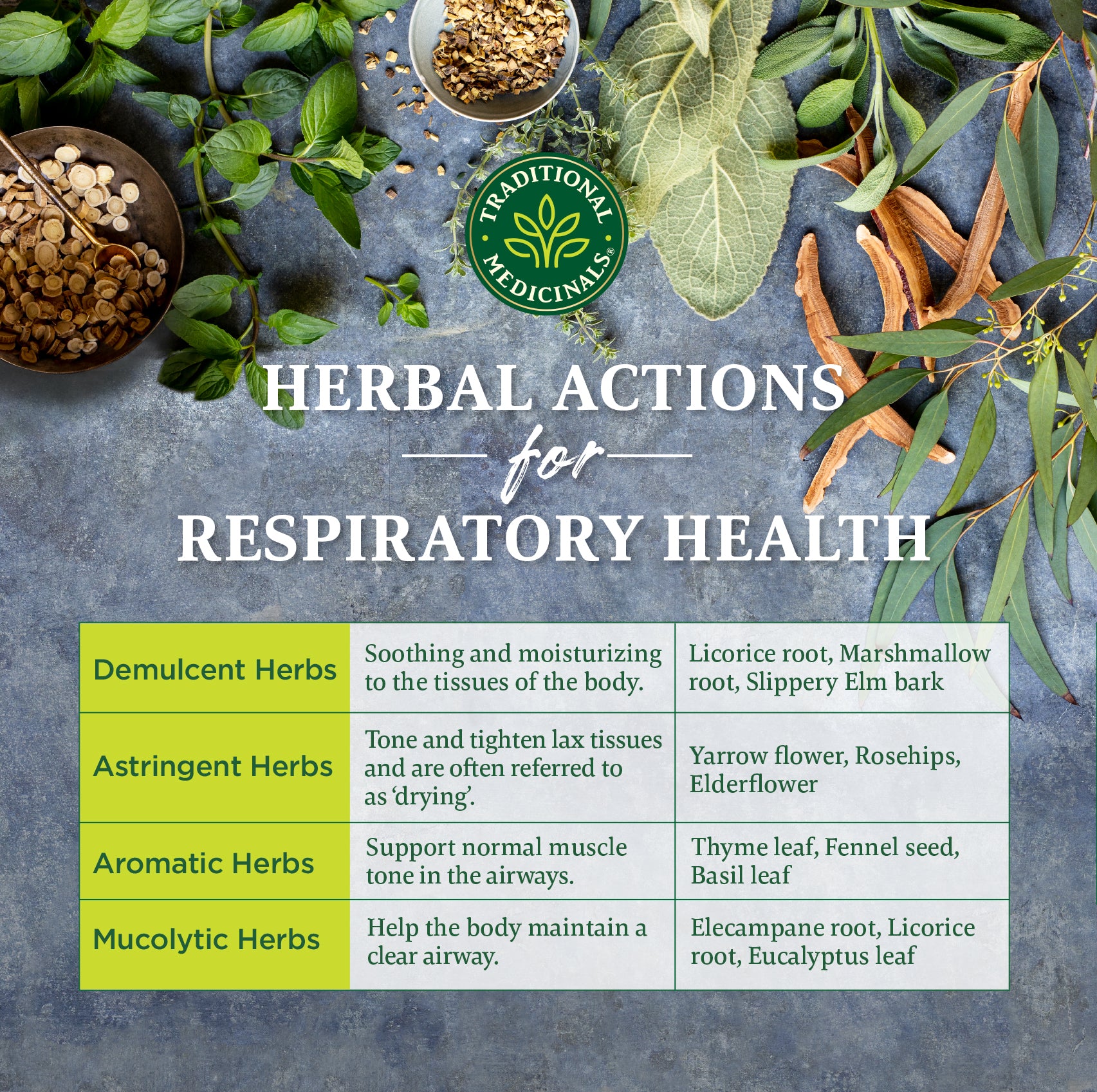
Demulcent vs. Astringent
To support good mucosal integrity, herbalists turn to plants that support normal, healthy tone in the membranes throughout the digestive tract and the rest of the body, and also ones that are soothing and moisturizing to our tissues. Astringent and demulcent herbs are used to balance out; astringents tone, or ‘dry’ tissues, while demulcents are moistening. The goal with these moisture-modulating herbs is to maintain a healthy mucosal lining throughout the digestive tract.*
Demulcent herbs contain soluble fiber polysaccharides. These molecules (known as hydrocolloids) are water-loving, swelling as they collect and retain water molecules. If you have ever soaked flax or chia seeds, you have seen this in action. Drinking a tea of demulcent herbs can be just what you need to support throat health, which is the gateway to the respiratory tract. Marshmallow root, slippery elm, and licorice root are all great examples of demulcent herbs.*
Astringent herbs have the opposite effect. Considered “drying,” these herbs contain tannins and produce a tighter, more toned tissue state, making them very useful when internal forecasts become boggy and blocked; think about the dryness on your tongue when you sip a tannin-rich red wine. Astringent herbs used for respiratory health include elderflower, rosehips, and yarrow flower.*
Mucolytic Herbs
As you might guess from the sound of this word, mucolytics have to do with our mucus. Herbs with this action, like licorice root, elecampane root, and eucalyptus leaf help the body maintain a clear airway from excess mucus.
Aromatic Herbs
Within the bronchial tree, bronchi and bronchioles contain smooth muscles, which constrict or relax depending on the volume of air required by the body. Fennel seed and thyme leaf are two aromatic herbs that contain specific volatile constituents, such as esters and anethole, which seem to have a calming effect on the smooth muscle of the digestive tract. This suggests that they could also support a normal, relaxed tone in the muscles of the airway. Eucalyptus leaf can also be employed here as it contains the volatile constituent eucalyptol, a compound that supports the respiratory system.*
What’s Your Perfect Respiratory Tea?
Often our environment is a great indicator for our respiratory health: if you live somewhere hot, dry, and dusty, a blend that is cool and moistening is a good companion. Our Throat Coat Eucalyptus tea contains a soothing blend of marshmallow, licorice root, and eucalyptus leaf to support throat health and the respiratory system.*
If you live somewhere cold, wet, and boggy, consider a daily respiratory support blend with astringent, aromatic (warming) herbs like those in Urban Moonshine’s Clear Chest herbal syrup. As for tea, our Breathe Easy blend of warming fennel and ginger combine with the power of licorice to promote respiratory health like a breath of fresh air.*
A great option for soothing a cough or sore throat is our line of Throat Coat Lozenges.
- For occasional coughs, try the relieving effects of menthol in our Throat Coat Eucalyptus Mint Lozenges and Throat Coat Sweet Orange Fennel Lozenges.
- To soothe a sore throat, check out our Throat Coat Lemon Ginger Echinacea Lozenges.


